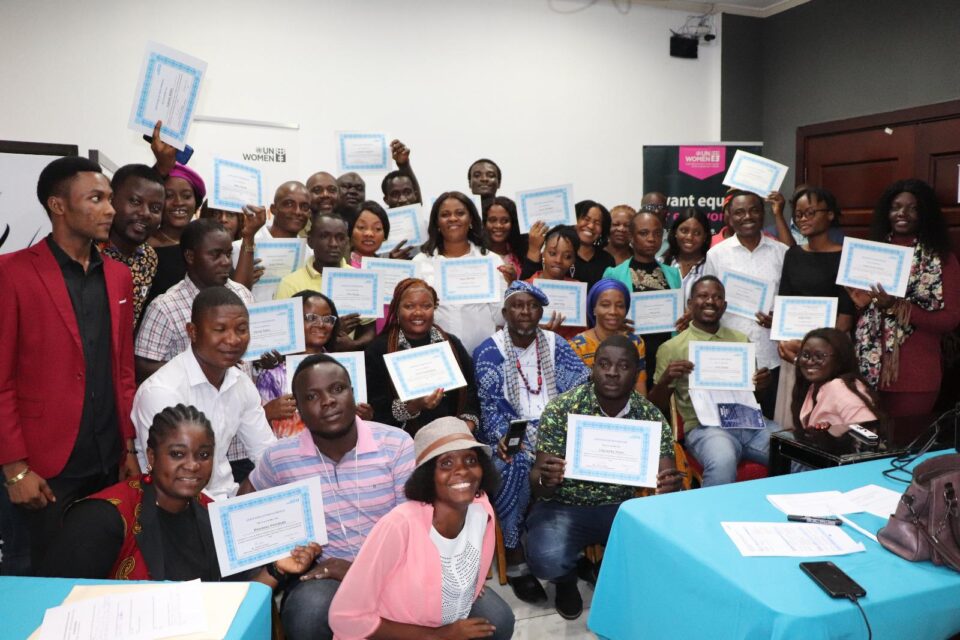At The End Of A Two-Day Media Ttraining In Monrovia
By Alfred Kollie, alfredkolliejr92@gmail.com
The Country Representative of UN Women in Liberia Madam Comfort Lamptey has officially launched a media award for Journalists reporting on the issue of Female Genital Mutilation or FGM in the country.
Speaking recently at the end of a two-day media training on objective reporting on FGM in Monrovia, the UN Women Country representative said the initiative is intended to inspire journalists to report more and publish more articles that will allow them to be at the forefront of positive change in the country.
She wants media practitioners or journalists to continue to be the voices of the voiceless, champions of change, and strong advocates for the elimination of FGM and other harmful practices not only in Liberia but across the world.
The first award ceremony, will be the first of its kind, will take February 2024 when journalists will be honored for the best story reported in the fight against FGM in Liberia.
The award is intended to encourage media practitioners to cover FGM stories by following the ABC method of journalism and to maintain ethical values and principles in reporting on gender and culture-sensitive issues across Liberia.
“As a tangible way of encouraging and rewarding those journalists, we are introducing a media award for reporting on FGM and we invite all of you to submit entries including written articles, and news broadcasts to show your commitment to objective, and gender-sensitive reporting,’’ Madam Lamptey explained.
The two-day Training Workshop on objective Reporting on FGM brought together several Media Practitioners and Civil Society actors across the country.
The training covered several topics which include, FGM and culture exploring the sociocultural dynamics, understanding FGM as human rights exploring the human rights framework on FGM and Liband international obligations, media ethics and responsible journalism, principles and guidelines.
Other topics covered are Sensationalism and stereotyping in FGM reporting, a modern-day phenomenon, interview technique, dealing with survivors and practicing communities, do not harm, fact-checking and ethical use of images and graphics, developing ethical, objective, and gender-sensitive reporting on FGM scenarios and journalism and advocacy strategies for collaborative engagement.
According to her, the two days will help empower and equip participants to do more in terms of reporting on FGM with objectivity.
The UN Women Liberia Country Representative however, stressed the need for the promotion and protection of the rights of women and girls in Liberia from harmful traditional practices.
“We are also developing in terms of our social system and cultural practices. So we should think of whatever is positive to support its development. We can develop economically and politically and can also develop socially and culturally,” Madam Lamptey observed.
Maintain value and principle of ethical reporting
Meanwhile, the facilitator of the training, who hails from Gambia and a consultant to UN Women, Madam Haddy Jonga urged journalists to maintain the value and principle of ethical reporting noting that journalists should learn that the story is not about them but about the community.
Madam Jonga encouraged participants to do more research and fact-check the information before releasing the story to the public.
“You have the power as media personnel and you understand the power and how that can impact the life and well-being of women and girls, you could contribute to making progress in your country. Until you commit to ensuring that whatever you do, you stick to the principles and ethics that guide your profession, we will not make headway’’ Madam Jonga noted.
She wants journalists specifically those covering FGM stories to remember when they dispense their duties that it is not about them, their opinions but about keeping the public informed and allowing them to make informed choices.
Madam Jonga however, urged media practitioners to always make use of the opportunity available to them by regularly getting information from the traditional leaders in reporting credible FGM stories.
Speaking on behalf of the participants, a reporter at the Liberia Broadcasting System Edward Tamba thanked the UN Women for such a unique opportunity to increase their skills and capacity as they continue to report FGM.
Mr. Tamba also recommended in collaboration with the participants, the establishment of the FGM Reporters Network of Liberia which he said will help equip and guide journalists reporting on FGM issues in collaboration with UN Women.
At the same time, participants have committed themselves and media institutions to regularly report stories based on accuracy, balance, and credibility on issues relating of FGM and other forms of violence against women and girls in Liberia.

